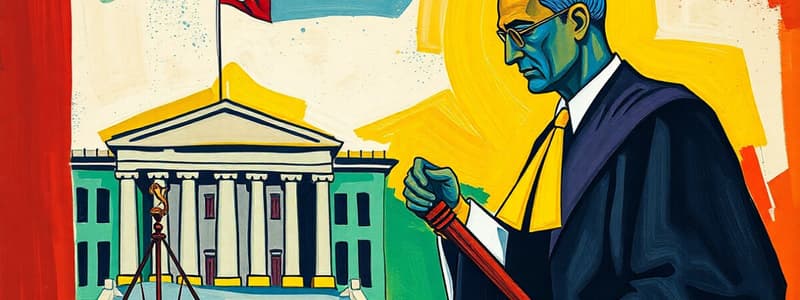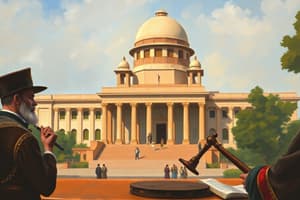Podcast
Questions and Answers
What is the primary role of an independent judiciary?
What is the primary role of an independent judiciary?
- To provide legal counsel to government officials.
- To ensure the supremacy of law and protect individual rights. (correct)
- To enforce laws as determined by the executive branch.
- To represent political parties in legal matters.
Which of the following best describes the concept of 'independence of judiciary'?
Which of the following best describes the concept of 'independence of judiciary'?
- Judges should be free from political pressures and external influence. (correct)
- Judges must follow public opinion in their rulings.
- Judiciary must collaborate closely with the executive branch.
- Judges are accountable only to the legislature.
What measure is implemented to ensure judges are free from political influence at the time of their appointment?
What measure is implemented to ensure judges are free from political influence at the time of their appointment?
- Judges are chosen based on their public popularity.
- Judges must have legal experience without considering their political affiliations. (correct)
- Appointments are made based on political party recommendations.
- Judges are appointed directly by the legislature.
What does the principle of rule of law imply about individuals in society?
What does the principle of rule of law imply about individuals in society?
Under what circumstances can a judge be removed from office?
Under what circumstances can a judge be removed from office?
Why is security of tenure important for judges?
Why is security of tenure important for judges?
How does an independent judiciary contribute to democracy?
How does an independent judiciary contribute to democracy?
What does accountability of the judiciary mean in a democratic system?
What does accountability of the judiciary mean in a democratic system?
What is one of the key factors that ensures the judiciary's independence?
What is one of the key factors that ensures the judiciary's independence?
What provides financial independence to the judiciary?
What provides financial independence to the judiciary?
Which of the following is NOT a function of an independent judiciary?
Which of the following is NOT a function of an independent judiciary?
What is required for the removal of a judge from the Supreme Court?
What is required for the removal of a judge from the Supreme Court?
What role does public opinion play in the judiciary's decision-making?
What role does public opinion play in the judiciary's decision-making?
Which judicial appointment process was established by the Supreme Court?
Which judicial appointment process was established by the Supreme Court?
What is the principle regarding judges' conduct during parliamentary discussions?
What is the principle regarding judges' conduct during parliamentary discussions?
Which notable case reflects the difficulty in removing a judge from office?
Which notable case reflects the difficulty in removing a judge from office?
What does 'contempt of court' relate to in the context of judicial criticism?
What does 'contempt of court' relate to in the context of judicial criticism?
In the appointment of judges, what aspect does the Chief Justice not solely control?
In the appointment of judges, what aspect does the Chief Justice not solely control?
What occurred during the 1991 motion to remove Justice V. Ramaswami?
What occurred during the 1991 motion to remove Justice V. Ramaswami?
What is indicated by the broken convention surrounding appointments of Chief Justices?
What is indicated by the broken convention surrounding appointments of Chief Justices?
What does the original jurisdiction of the Supreme Court of India specifically entail?
What does the original jurisdiction of the Supreme Court of India specifically entail?
Which of the following is NOT a function of the Supreme Court of India?
Which of the following is NOT a function of the Supreme Court of India?
What role does the High Court play in relation to lower courts?
What role does the High Court play in relation to lower courts?
Which statement correctly reflects the appellate jurisdiction of the Supreme Court?
Which statement correctly reflects the appellate jurisdiction of the Supreme Court?
In the context of the judiciary, what does 'judicial activism' refer to?
In the context of the judiciary, what does 'judicial activism' refer to?
How does the Supreme Court of India's advisory jurisdiction function?
How does the Supreme Court of India's advisory jurisdiction function?
What is the consequence if a case of contempt occurs against the Supreme Court?
What is the consequence if a case of contempt occurs against the Supreme Court?
Which statement about the binding nature of the Supreme Court's decisions is correct?
Which statement about the binding nature of the Supreme Court's decisions is correct?
What is the primary function of the writ jurisdiction of the Supreme Court?
What is the primary function of the writ jurisdiction of the Supreme Court?
What is a key feature of the Indian judiciary's structure?
What is a key feature of the Indian judiciary's structure?
Flashcards are hidden until you start studying
Study Notes
What is an Independent Judiciary?
- The judiciary is an independent body that settles disputes between individuals, groups, and the government.
- It protects the rule of law and ensures the supremacy of law.
- It safeguards individual rights and ensures democracy doesn't become a dictatorship.
- Independence implies freedom from political pressures.
How is an Independent Judiciary Ensured?
- The judiciary is accountable to the Constitution, democratic traditions, and the people.
- Judges are appointed based on legal experience and knowledge, not political beliefs.
- Judges have a fixed tenure and can only be removed in exceptional circumstances.
- The judiciary is financially independent from the executive and legislature.
- Judges are protected from unfair criticism through contempt of court laws.
Appointment of Judges
- The appointment of judges is a political process.
- The Chief Justice of India (CJI) is usually appointed as per seniority.
- The President appoints other Supreme Court and High Court judges after consulting the CJI.
- The Supreme Court has established a collegiality principle for appointments, where the CJI consults with four senior-most judges.
Removal of Judges
- Removing judges of the Supreme Court and High Courts is extremely difficult.
- A judge can only be removed for proven misbehaviour or incapacity by a special majority vote in both houses of Parliament.
- The first attempt to remove a Supreme Court judge was unsuccessful due to a lack of support from the Congress Party.
Structure of the Judiciary
- India has a single, integrated judicial system with a pyramidal structure.
- The Supreme Court is at the top, followed by High Courts, and district and subordinate courts at the lowest level.
- Higher courts have direct superintendence over lower courts.
Jurisdiction of the Supreme Court
- The Supreme Court has original, appellate, and advisory jurisdiction.
- Original jurisdiction means cases involving federal relations can be directly considered by the Supreme Court.
- Writ jurisdiction allows the Supreme Court to issue orders to enforce fundamental rights.
- Appellate jurisdiction allows the Supreme Court to reconsider decisions made by High Courts.
- The Supreme Court can review its own judgments and its decisions are binding on all courts in India.
- Advisory jurisdiction allows the President to refer matters of public importance to the Supreme Court for advice.
Judicial Activism and Public Interest Litigation
- These terms are often used in discussions about the judiciary.
- Many believe these concepts have revolutionized the judiciary and made it more people-friendly.
Studying That Suits You
Use AI to generate personalized quizzes and flashcards to suit your learning preferences.



